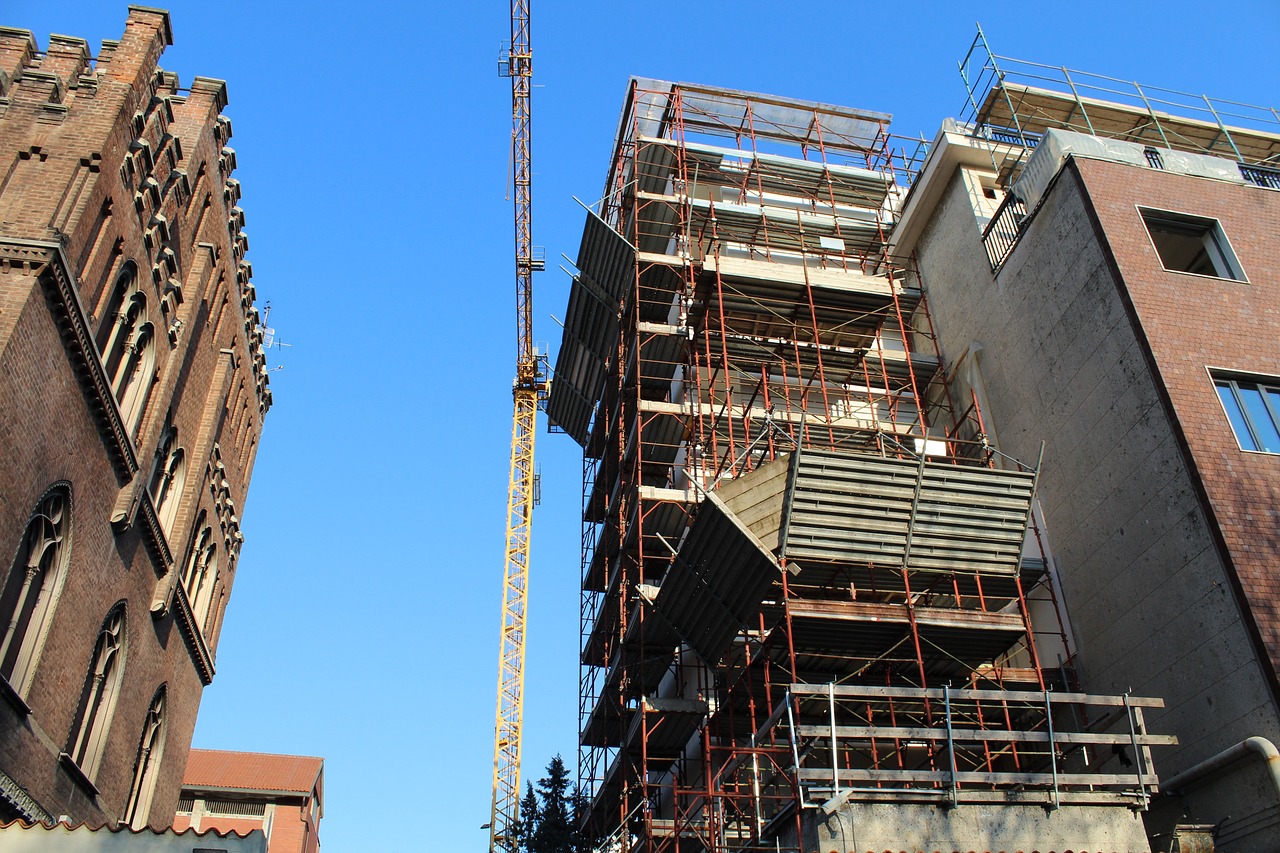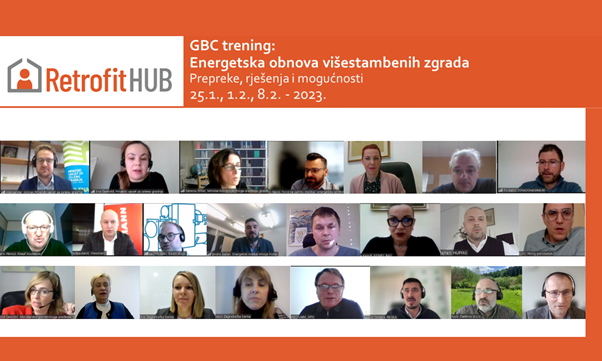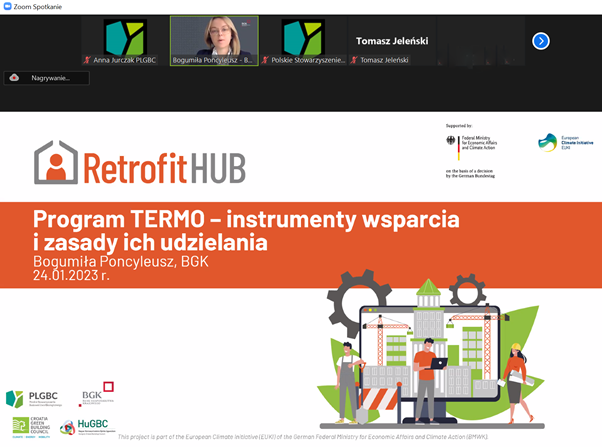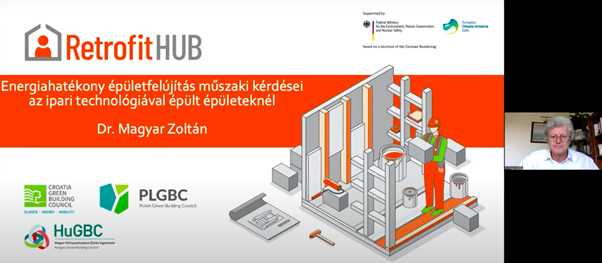Project Retrofit HUB: Training Activities
The project Retrofit HUB focuses on delivering pertinent knowledge and information to all stakeholders in the process of energy renovation of multifamily buildings in Croatia, Poland and Hungary. Project activities are in progress, and partners (Green Building Councils from Croatia, Poland and Hungary) have so far completed interviews with facility managers, condominium representatives, representatives of funding institutions and energy renovation experts.

Conclusions have been summarised in the Overview of current practices, which serves as an edifying document on current practices in energy renovation of multifamily buildings in Croatia, Poland and Hungary. Additionally, project partners have performed National Focus Group (NFG) meetings with relevant stakeholders to identify critical issues in energy renovation processes on a national level, and to recognise steps for acceleration of renovation. The findings of the NFG meetings run will serve as a baseline for creating a Guidebook for energy renovation of multifamily buildings.
The focus is now pivoted to training activities which are envisioned to be organised by carrying two methods. The first method aims to organise training for all stakeholders in the process of renovation, and the second method aspires to organise case study workshops where designated buildings will be analysed and recommendations for their renovation will be suggested.
Training for all stakeholders in the process of energy renovation was carried out by the end of April 2023, and project partners have transferred their experiences and findings below.
Training activities in Croatia
Online training on the topic of energy renovation of multifamily buildings was held in a cycle of three consecutive weeks at the beginning of 2023. Relevant lecturers were gathered to comprehensively elaborate the three main determinants of the renovation: regulatory framework, technical solutions and financing. The training attracted 500 participants, and almost 100 questions were asked during the lecturer’s presentation.
Two models of renovation financing were emphasized: co-financing with public funds and independent financing with the co-owner’s own funds and loans from private banks. The lecturers recommend improving the renovation process in Croatia by increasing the allocation of funds, simplifying administrative procedures and introducing sustainable co-financing models.
The advantages of centralized heat systems were highlighted, which include higher energy efficiency of heat energy production than with individual systems, easier integration of renewable sources, lower greenhouse gas emissions, simpler energy source change, greater comfort for the end user, greater security of supply, less susceptibility to price changes and a reduction in options the occurrence of fires, explosions and carbon monoxide poisoning.
“Green financing” was defined, and its purpose related to renewable energy sources and energy efficiency; pollution prevention and control, environmentally sustainable management, clean forms of transport, sustainable water and waste water management, adaptation to climate change, and sustainable buildings.

Training activities in Poland
The Polish Green Building Council PLGBC conducted two three-day training courses in January and April 2023. It was focused on the topic of how to effectively and efficiently carry out renovations of multifamily buildings. The training programme was developed in the course of joint cooperation of PLGBC staff and external experts, meeting in the project working group. To the group were invited experts with expertise in the field of building retrofits, including energy auditors, property managers, engineers, designers, representatives of the financial sector, which made it possible to create a comprehensive training course with interesting topics. The training was aimed at all the people interested in energy renovation of buildings, i.a. private and municipal facility managers, contractors, consultants and students.
The training was focused on three main themes: technical aspects, financing and communication. The detailed scope of the training included such topics as the importance of energy audits in renovation, legislation, benefits of thermal imaging tests, ventilation in multifamily buildings, renewable energy sources, including heat pumps and photovoltaics, importance of regulation and automation of central heating and hot water installations, renovations of heritage buildings. There were approximately 116 attendees in the January edition and approximately 70 attendees in April. Participants of the training courses included i.a. private property managers, representatives of local authorities, energy auditors, consultants, designers and architects, and research institutes.
The knowledge provided at the workshop will furthermore be compiled in a guidebook, which will be the ultimate output of the project.
The next step in the implementation of the project are three case study workshops to show participants interesting examples of renovation of multifamily buildings and guide them in practical decision-making.

Training activities in Hungary
HuGBC – During February and March, HuGBC offered 3 online training courses focusing on the practical aspects of energy-efficient building renovation for 3 types of buildings. The training was mainly addressed to condominium managers and joint representatives, but other professionals interested in renovation management or decision-making also attended (property owners, and municipality representatives). The training courses were grouped around 3 themes (technical, financial, and communication). The training reached 206 participants (1st training: 96 attendees, 2nd training: 70, 3rd training: 40).
Our speakers were: Dr Zoltán Magyar, Associate Professor, heating and district heating engineer, mechanical engineer, Managing Director, Comfort Consulting Ltd.; Ilona Illésné Szécsi, Professional Associate, RenoPont Project Manager, Hungarian Energy Efficiency Institute (MEHI); Zoltán Varga, economist, mediator, Mihály Czabarka, condominium renovation strategist, managing director, Projectdoctor Kft.

